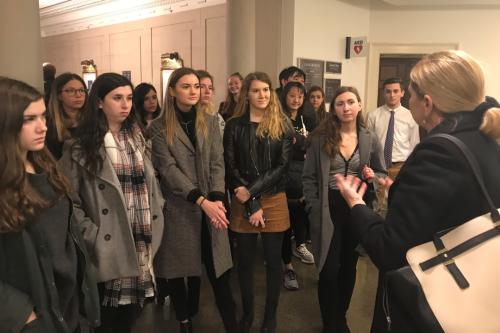BS in Cognitive Neuroscience
In the innovative Bachelor of Science in Cognitive Neuroscience program, students gain fluency in cognitive neuroscience, develop their analytical thinking and refine their ability to present compelling scientific arguments in both written and oral form. High-achieving students often assist in undergraduate research, external internships and honors seminars in special topics.
In the classroom, cognitive neuroscience students learn the fundamental theories, methods and results involved in neurobiology, cognitive neuroscience and the study of complex behavior.
"My passion for cognitive neuroscience is a result of the quality of my instructors … and being able to conduct my own research as an undergraduate."
Paul Scotti
BA '17
Cognitive Neuroscience in Action
Quieting the Voices of Schizophrenia
Assistant Professor of Cognitive Neuroscience Guangying Wu is trying to pinpoint the the misfiring neurons that cause agonizing internal noise for people with schizophrenia. His research enlisted the help of student researchers, colleagues in other scientific disciplines and a pack of genetically engineered mice.
Course Requirements
The following requirements must be fulfilled:
The general requirements stated under Columbian College of Arts and Sciences, Undergraduate Programs.
Program-specific curriculum:
| Code | Title | Credits |
|---|---|---|
| Required | ||
| 11 to 14 credits in introductory natural science courses, including 8 credits in biological sciences and 3 or 6 credits in mathematics. | ||
| BISC 1111 | Introductory Biology: Cells and Molecules | |
| BISC 1112 | Introductory Biology: The Biology of Organisms | |
| MATH 1220 & MATH 1221 | Calculus with Precalculus I and Calculus with Precalculus II | |
| or MATH 1231 | Single-Variable Calculus I | |
| Two courses (6 credits) in analytical methods selected from the following: | ||
| CSCI 1011 | Introduction to Programming with Java | |
| CSCI 1012 | Introduction to Programming with Python 1 | |
| DATS 1001 | Data Science for All | |
| PUBH 3201 | Introduction to Bioinformatics | |
| STAT 1127 | Statistics for the Biological Sciences 2 | |
| Three gateway courses (9 to 10 credits) that introduce core concepts, selected from the following: | ||
| ANAT 2160 | Human Functional Neuroanatomy | |
| ANTH 1005 | The Biological Bases of Human Behavior | |
| BISC 2320 | Neural Circuits and Behavior | |
| PHIL 1153 | The Meaning of Mind | |
| PHIL 2045 | Introduction to Logic | |
| PSYC 2014 | Cognitive Psychology | |
| PSYC 2015 | Biological Psychology | |
| SLHS 2106 | Neural Substrates of Speech, Language, and Hearing | |
| SLHS 2131 | Language Acquisition and Development | |
| SLHS 2135 | Language: Structure, Meaning, and Use | |
| Six intermediate content courses (18 credits), which must include two courses from cellular/molecular/systems neuroscience group and four from the cognitive science/cognitive neuroscience group: | ||
| Cellular/molecular/systems neuroscience | ||
| ANTH 3413 | Evolution of the Human Brain | |
| BISC 2220 | Developmental Neurobiology | |
| BISC 3320 | Human Neurobiology | |
| PSYC 3181 | Introduction to Psychopharmacology | |
| Cognitive science/cognitive neuroscience | ||
| ANTH 3503 | Psychological Anthropology | |
| PHIL 3121 | Symbolic Logic | |
| PHIL 3153 | Mind, Brain, and Artificial Intelligence | |
| PSYC 3115 | Developmental Psychopathology | |
| PSYC 3118 | Neuropsychology | |
| PSYC 3119 | Cognitive Science in the District | |
| PSYC 3120 | Neuroscience of Consciousness | |
| PSYC 3121 | Memory and Cognition | |
| PSYC 3122 | The Cognitive Neuroscience | |
| PSYC 3124 | Visual Perception | |
| PSYC 3127 | Social and Affective Neuroscience | |
| PSYC 3128 | Health Psychology | |
| PSYC 3180 | Seminar in Cognitive Science | |
| SLHS 3116 | Brain and Language | |
| SLHS 3117 | Hearing and Perception | |
| SLHS 3132 | Literacy | |
| SLHS 3133 | Autism | |
| One research/laboratory experience (3 to 4 credits) in the Biology (BISC), Psychological and Brain Sciences (PSYC), or supervised internships/independent research projects taken for course credit in PSYC or Speech, Language, and Hearing Sciences (SLHS) departments: 3 | ||
| BISC 2452 & BISC 2453 | Animal Behavior and Animal Behavior Laboratory | |
| PSYC 4106W | Research Lab in Sensation and Perception | |
| PSYC 4107W | Research Lab in Cognitive Neuroscience | |
| PSYC 3591 | Supervised Research Internship | |
| PSYC 4591 | Independent Research | |
| SLHS 4196 | Independent Study (taken for at least 3 credits) | |
| Four advanced content courses (12 to 16 credits) selected from the following: | ||
| ANTH 3401 | Human Functional Anatomy | |
| ANTH 3402 | Human Evolutionary Anatomy | |
| ANTH 3412 | Hominin Evolution | |
| or ANTH 3412W | Hominin Evolution | |
| ANTH 3491 | Topics in Biological Anthropology 4 | |
| ANTH 3501 | Anthropology of Development | |
| ANTH 3601 | Language, Culture, and Cognition | |
| ANTH 3603 | Psycholinguistics | |
| ANTH 3691 | Special Topics in Linguistic Anthropology 4 | |
| ANTH 3995 | Undergraduate Research 4 | |
| BISC 3165 | Biochemistry I | |
| BISC 3166 | Biochemistry II | |
| BISC 3209 | Molecular Biology | |
| BISC 3320 | Human Neurobiology | |
| BISC 4132 | Advanced Cellular-Molecular Biology | |
| BISC 4171 | Undergraduate Research 4 | |
| or BISC 4171W | Undergraduate Research | |
| BISC 4172 | 4 | |
| or BISC 4172W | Research Internship and Writing in Biology | |
| CHEM 2151 & CHEM 2153 | Organic Chemistry I and Organic Chemistry Laboratory I | |
| CHEM 2152 & CHEM 2154 | Organic Chemistry II and Organic Chemistry Laboratory II | |
| CHEM 4195 | Undergraduate Research 4 | |
| PHIL 3121 | Symbolic Logic | |
| PHIL 3151 | Philosophy of Science | |
| or PHIL 3151W | Philosophy and Science | |
| PHIL 3152 | Theory of Knowledge | |
| PHIL 3153 | Mind, Brain, and Artificial Intelligence | |
| PHIL 3251 | Philosophy of Biology | |
| PHIL 4196 | Topics in Theory of Knowledge 4 | |
| PHIL 4199 | Readings and Research 4 | |
| or PHIL 4199W | Readings and Research | |
| PSYC 3116 | Brain and Language | |
| PSYC 3118 | Neuropsychology | |
| PSYC 3119 | Cognitive Science in the District | |
| PSYC 3120 | Neuroscience of Consciousness | |
| PSYC 3121 | Memory and Cognition | |
| PSYC 3122 | The Cognitive Neuroscience | |
| PSYC 3124 | Visual Perception | |
| PSYC 3180 | Seminar in Cognitive Science | |
| PSYC 3198 | Current Research Issues 4 | |
| PSYC 3199 | Current Topics in Psychology 4 | |
| PSYC 3591 | Supervised Research Internship 4 | |
| PSYC 4106W | Research Lab in Sensation and Perception | |
| PSYC 4107W | Research Lab in Cognitive Neuroscience | |
| PSYC 4591 | Independent Research 4 | |
| PSYC 4997 | Honors Seminar | |
| PUBH 3201 | Introduction to Bioinformatics | |
| SLHS 3117 | Hearing and Perception | |
| SLHS 3132 | Literacy | |
| SLHS 3133 | Autism | |
| SLHS 4196 | Independent Study 4 | |
| STAT 3119 | Design and Analysis of Experiments | |
1 CSCI 1012 is recommended but not required to fulfill this requirement.
2If a student wishes to take a Statistics course to fulfill this requirement, STAT 1127 is recommended but an equivalent STAT course may be substituted.
3The research/laboratory experience requirement can also be fulfilled by taking any of the independent research courses offered by the associated departments. Courses that can be taken to fulfill the requirement are listed in the advanced content section with the footnote 4. All courses so noted can be taken multiple times and each enrollment can be applied to either the advanced content or the research experience requirement. Note that each independent research course can be applied to either the lab or the elective requirement and not to both at the same time.
4These courses could have GPA requirements and require the permission of the instructor. Students should contact the relevant departments for more information. Each course must be taken for a total of at least 3 credits to count toward the requirement.




